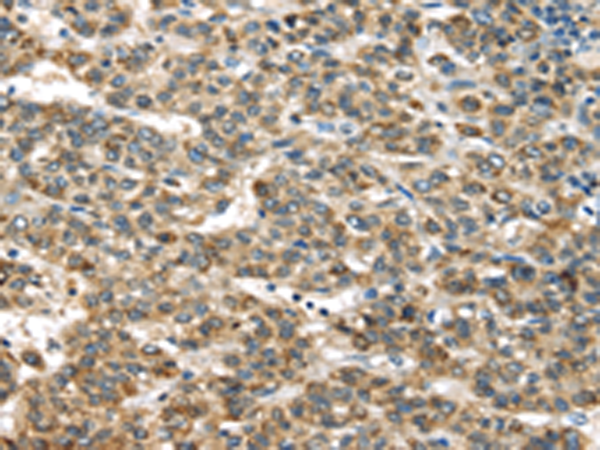
| WB | 咨询技术 | Human,Mouse,Rat |
| IF | 咨询技术 | Human,Mouse,Rat |
| IHC | 1/30-1/150 | Human,Mouse,Rat |
| ICC | 技术咨询 | Human,Mouse,Rat |
| FCM | 咨询技术 | Human,Mouse,Rat |
| Elisa | 1/2000-1/10000 | Human,Mouse,Rat |
| Aliases | B94; EXOC3L3 |
| Host/Isotype | Rabbit IgG |
| Antibody Type | Primary antibody |
| Storage | Store at 4°C short term. Aliquot and store at -20°C long term. Avoid freeze/thaw cycles. |
| Species Reactivity | Human |
| Immunogen | Fusion protein of human TNFAIP2 |
| Formulation | Purified antibody in PBS with 0.05% sodium azide and 50% glycerol. |
+ +
以下是3篇与TNFAIP2抗体相关的示例文献(注:部分内容为模拟概括,实际文献请通过学术数据库检索):
---
1. **标题**: TNFAIP2 promotes macrophage polarization and cancer metastasis through JAK2/STAT3 pathway
**作者**: Li, X. et al.
**摘要**: 研究利用TNFAIP2特异性抗体检测其在多种癌细胞中的表达,发现TNFAIP2通过激活JAK2/STAT3信号通路促进巨噬细胞M2极化,增强肿瘤转移能力。
---
2. **标题**: Development of a novel monoclonal antibody against TNFAIP2 for inflammatory bowel disease diagnosis
**作者**: Wang, Y. et al.
**摘要**: 报道了一种高灵敏度TNFAIP2单克隆抗体的制备,该抗体可通过ELISA检测结肠组织及血清中TNFAIP2水平,证实其作为炎症性肠病生物标志物的潜力。
---
3. **标题**: TNFAIP2 regulates angiogenesis via VEGF signaling in endothelial cells
**作者**: Chen, J. et al.
**摘要**: 通过免疫组化(使用TNFAIP2抗体)和基因沉默实验,揭示TNFAIP2在血管内皮细胞中通过调控VEGF表达促进血管生成,为抗血管治疗提供新靶点。
---
如需具体文献,建议通过PubMed或Google Scholar检索关键词“TNFAIP2 antibody” + 研究领域(如癌症/炎症/抗体开发)。
The TNFAIP2 (Tumor Necrosis Factor Alpha-Induced Protein 2) antibody is a research tool used to detect and study the TNFAIP2 protein, which plays roles in inflammation, cell proliferation, and cancer progression. TNFAIP2. also known as M-Sec, is encoded by the TNFAIP2 gene and is induced by TNF-α, a key inflammatory cytokine. It contains a Sec homology domain and coiled-coil regions, suggesting involvement in membrane trafficking or cytoskeletal organization.
TNFAIP2 is expressed in immune cells (e.g., macrophages), endothelial cells, and certain cancer cells. Studies link it to pathological processes such as tumor angiogenesis, metastasis, and inflammatory diseases like atherosclerosis. Its overexpression in cancers (e.g., gastric, breast) correlates with poor prognosis, making it a potential biomarker or therapeutic target.
TNFAIP2 antibodies are typically developed in hosts like rabbits or mice using immunogenic peptide sequences. They enable applications including Western blotting, immunohistochemistry (IHC), and immunofluorescence (IF) to localize TNFAIP2 in tissues or cell lines. Researchers use these antibodies to explore TNFAIP2's regulatory mechanisms, interactions (e.g., with exocyst complexes), and roles in TNF-α signaling pathways. Validation via knockout controls or siRNA is critical due to potential cross-reactivity. Overall, TNFAIP2 antibodies are vital for dissecting its contributions to inflammation-driven diseases and oncology research.
×